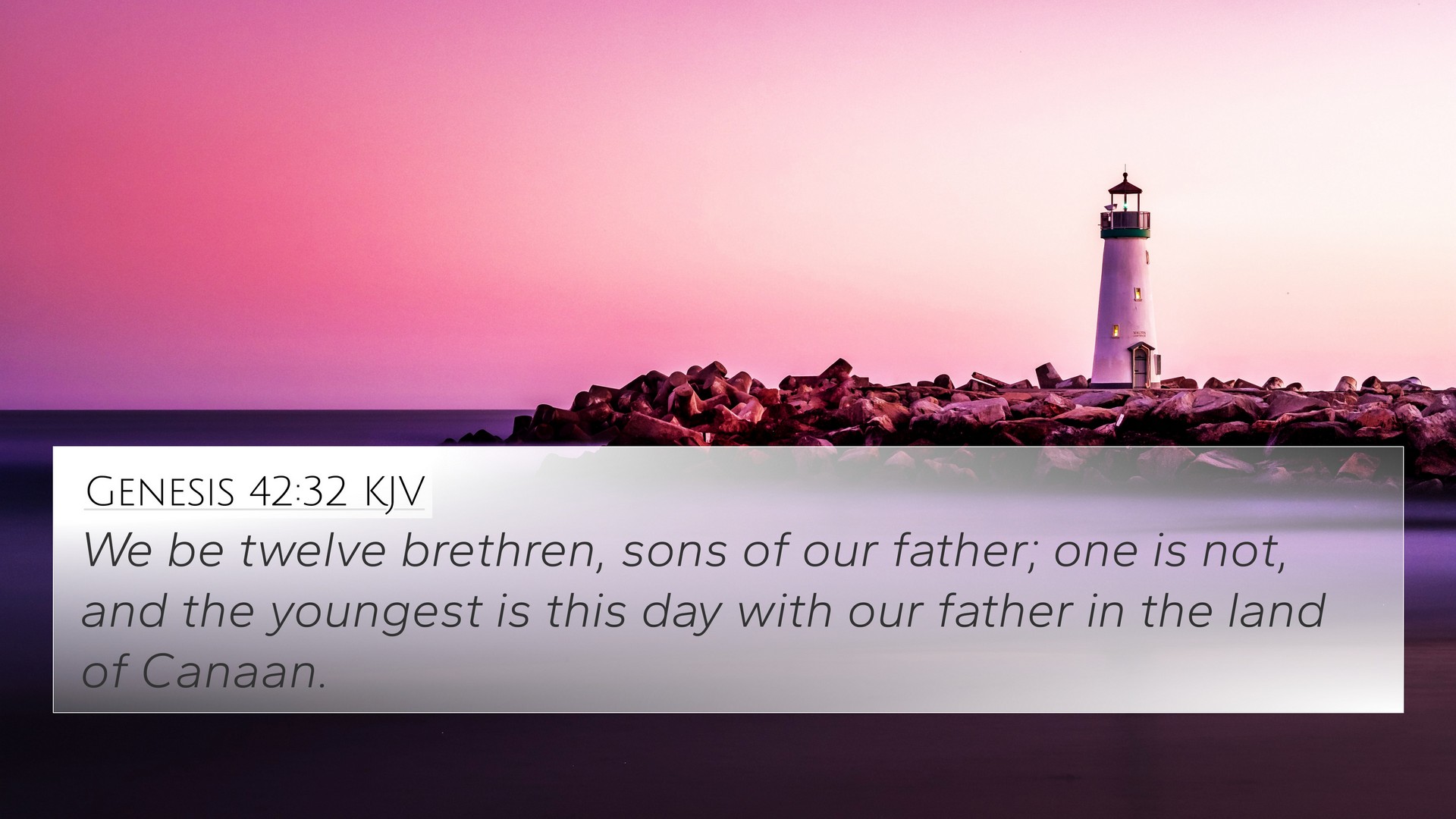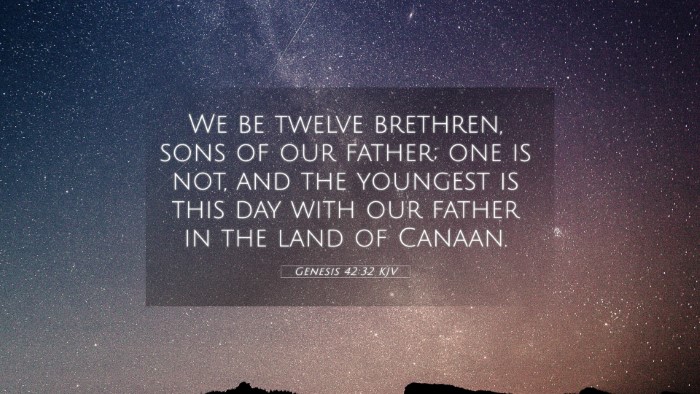Understanding Genesis 42:32
Verse: "We are twelve brethren, sons of our father; one is not; and the youngest is this day with our father in the land of Canaan."
Summary of Meaning:
Genesis 42:32 presents a significant moment in Joseph's story, where the brothers recount their family structure to Joseph, whom they do not recognize. This verse emphasizes themes of family, loss, and the complexities of relationships. Matthew Henry elaborates that the brothers' declaration underscores their designation as favored sons, while also highlighting their deep-seated fear of losing another brother. Albert Barnes notes that the brothers felt obligated to explain their family situation, thus revealing their past guilt over Joseph's disappearance. Adam Clarke points out that this recitation serves to illustrate their innocence in the current predicament, as they were merely seeking sustenance during a time of famine.
Key Themes and Insights
-
Family Dynamics: The verse reveals the dynamics of Jacob's family. The mention of "twelve brethren" signifies the significance of the family unit in biblical narratives, suggesting a communal identity intertwined with individual experiences.
-
The Weight of Guilt: The statement "one is not" reflects the brothers' lingering guilt regarding Joseph’s fate, hinting at unresolved issues that affect their current situation, as noted by Henry.
-
Divine Providence: This moment speaks to the overarching theme of God’s providence, as Joseph’s position in Egypt ultimately serves a greater purpose in God’s plan for the Israelite nation.
Key Cross-References
- Genesis 37:4-11: The jealousy and tension that arise from Jacob’s favoritism towards Joseph.
- Genesis 41:50-52: Joseph's own family background, implying he understands the significance of family ties.
- Exodus 1:8-14: The plight of the Israelites also mirrors the famine in Genesis, connecting Joseph's story to the broader narrative of Israel's suffering.
- Matthew 10:21: The emphasis on familial relationships resonates through the New Testament, where it discusses how family bonds might turn against believers.
- Luke 15:11-32: The Parable of the Prodigal Son exemplifies themes of lost sons and reconciliation similar to Joseph's narrative.
- Acts 7:9-10: Stephen recounts Joseph's story, linking it to God's providence and the fulfillment of His plan amidst human actions.
- Hebrews 11:21: The mention of faith in patriarchs connects back to the promise of God to Abraham's descendants, emphasizing a covenantal relationship.
Comparative Analysis
This verse can be analyzed in light of similar declarations in other biblical texts where familial identities play crucial roles. The connections between Bible verses become apparent, particularly in the context of emotional burdens carried through generations. By examining how these relationships influence the actions and fates of biblical figures, one can see a thematic unity that pervades scripture.
Thematic Connections
Throughout the scriptures, family and familial loss often lead to profound lessons about perseverance, divine purpose, and redemption. Genesis 42:32 thus serves as a microcosm of these larger biblical themes:
- Loss and Redemption: Just as the brothers grapple with the loss of Joseph, the New Testament reflects the ultimate loss of Christ, leading to redemption.
- Identity and Belonging: The brothers establish their identity through familial bonds, illustrating that our connections define our roles within the divine tapestry.
- Divine Plan through Human Struggle: Both Joseph's story and the accounts in the Gospels underscore how human actions can fit into God's grand design.
Conclusion
In summary, Genesis 42:32 encapsulates pivotal themes of family, loss, and providential care within the narrative of Joseph and his brothers. Cumulatively, the insights drawn from public domain commentaries create a richer understanding of the multi-faceted relationships presented in the Bible and highlight the importance of biblical cross-references to unravel deeper theological meanings.
As readers engage in cross-referencing biblical texts, they find that understanding scripture often requires looking at the interconnectedness of passages, advocating for a more thorough and enlightened approach to Bible study that emphasizes themes and parallels across both the Old and New Testaments.


